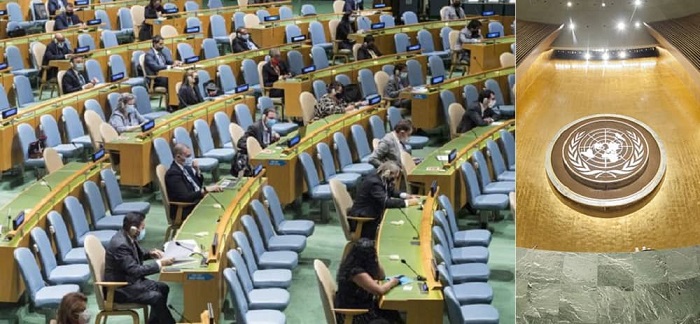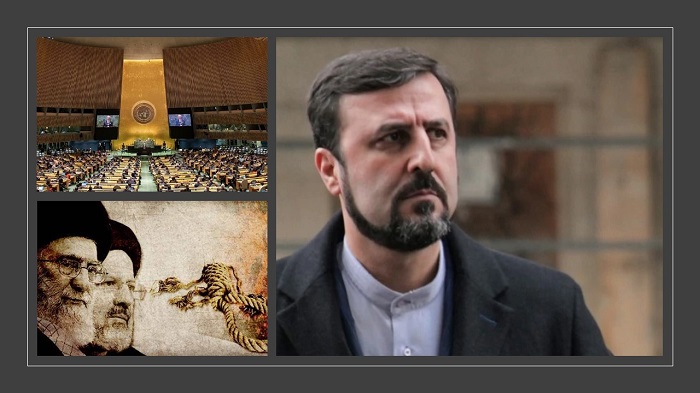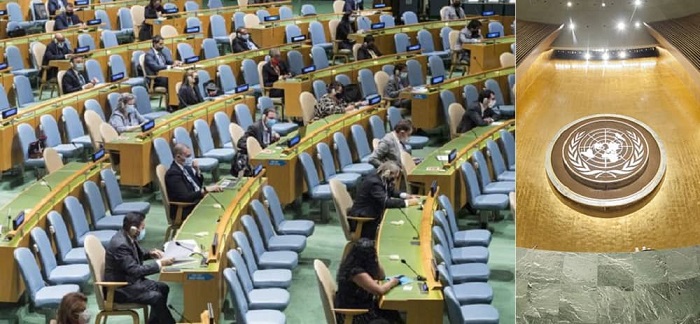
The United Nations General Assembly, in its 76th session, passed a resolution criticizing the Iranian regime’s human rights violations. This is the 68th UN resolution on Iran’s human rights status since the Islamists took power in 1979, and it was passed with 78 favorable votes.
Iran’s egregious human rights violations
“The importance of credible, independent, and impartial investigations in response to all cases of serious human rights violations…including enforced disappearances, extrajudicial executions, and evidence destruction in relation to such violations,” the resolution says.
The Un General resolution also calls for an end to “impunity for such violations.”
The resolution comes as the world becomes increasingly aware of Iran’s egregious human rights violations. The massacre of 30,000 Iranian political prisoners in 1988 is being investigated by a Swedish court. Ebrahim Raisi, the regime’s new president, is notorious for his role in the 1988 massacre and other atrocities against dissidents and ordinary Iranians, which has alarmed human rights groups and activists around the world.
The regime’s leaders must face international prosecution
“While this resolution reflects only a small portion of the crimes of the ruling religious fascism in Iran,” said Mrs. Maryam Rajavi, President-elect of the National Council of Resistance of Iran (NCRI), “it, nonetheless, proves that this regime has always been the leading human rights violator in the world.”
Mrs. Rajavi urged the United Nations Security Council to address the Iranian regime’s four decades of crimes against humanity and genocide, “particularly the 1988 massacre of 30,000 political prisoners, mostly members and supporters of the People’s Mojahedin of Iran (PMOI / MEK Iran), and the massacre of 1,500 demonstrators in 2019.”
She further stated that the regime’s leaders, particularly Ali Khamenei, Ebrahim Raisi, and the Chief of the Judiciary, Gholam Hossein Mohseni Eje’I, must face international prosecution. “The international community must reject this regime and put an end to the impunity enjoyed by its criminal leaders,” she stated.
Coerced confessions
“This subject has no basis and is far from the truth,” Kazem Gharibabadi, the secretary of the regime’s so-called “human rights staff,” said in reaction to the UNGA resolution. The Islamic Republic’s constitution prohibits not just the use of torture, but also the extraction of confessions through torture.”
Multiple verifiable accounts of captives being tortured in prisons and pushed to produce incriminating confessions against themselves are worth highlighting. On the basis of these coerced confessions, many of these detainees have been executed. “The resolution criticizes the volume of executions in Iran,”

People under the age of 18 should not be put to death
Gharibabadi remarked, defending Iran’s alarming rate of executions. However, you must take note that the prohibition of execution is a Western notion. If Western countries have abolished capital punishment, does it mean that all other countries must follow suit and it must become a global standard?”
Gharibabadi also verified and defended the regime’s record-breaking number of minor offenders executed. “The death penalty for people under the age of 18 is also discussed in this resolution,” he stated. “It’s important to remember that there is no international agreement that people under the age of 18 should not be put to death. One of the UN Convention on the Rights of the Child’s articles specifies that children must be 18 years old unless their national law states differently.”
MEK Iran (follow us on Twitter and Facebook), Maryam Rajavi’s on her site, Twitter & Facebook, NCRI (Twitter & Facebook) and People’s Mojahedin Organization of Iran – MEK IRAN – YouTube











